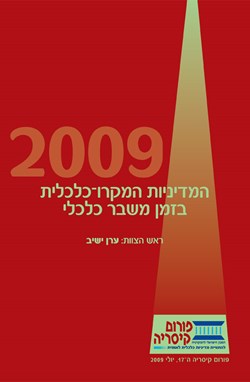Macroeconomic Policy in Times of Financial Crisis
17th Caesarea Economic Forum, July 2009
- Written By: Eran Yashiv, David Brodet
- Publication Date:
- Cover Type: Online | Hebrew
- Number Of Pages: 89 Pages
- Center: Eli Hurvitz Conference on Economy and Society
A volume that explores the impact of the global financial crisis on the Israeli economy, the steep decline in tax collection and drop in public consumption, problems of a biannual budget, and recommended preparations for an excessive budget deficit.
The state of the economy and the policy recommendations in this report were written in the shadow of the world crisis that began in 2007 and intensified from mid-September 2008 onward. In this environment, changes to the macroeconomic picture, with implications for government policy, were happening too quickly. This report surveys the state of the Israeli economy (chapter 1), and presents recommendations for government policy in the fiscal realm (chapter 2) and monetary realm (chapter 3), as well as recommendations for the labor market (chapter 4). Chapter 5 examines the structural problems of the Israeli economy.
The report also relates to aspects of policy that go beyond an immediate response to the crisis, including the mix of taxes, the principles for government intervention in the credit market, and the advantages and disadvantages of the labor market policy. Chapter 5 addresses the policy steps that the Israeli economy needs in the long-term. The chapter relates to how the budget is formulated, to activity on the free market as a way of managing monetary policy, to regulation of financial markets, and to dealing with problems of labor force participation. It also enumerates issues that require attention in education, inequality, and infrastructure.

